This is a policy that puts farmland above homes as is argued eloquently here by the respected environmental campaigner George Monbiot.
It is somewhat worrying that reports by the Environment Agency on sensible catchment management appear to have been suppressed and deleted. This is just unacceptable so at the Angling Trust we have decided that a crucial Environment Agency document should be returned to public view. Titled “Evidence: Impacts of dredging”, and first published in 2013, we have now republished on our website.
Here are some of the more important findings:
“Increasing risk downstream: Dredging could in theory speed up flow and potentially increase the risk of flooding downstream. This is fully covered by the existing research.”
“Channels which have been artificially deepened by dredging silt-up more frequently as they return to their pre-dredged state. In these situations dredging will be an unsustainable activity since it needs to be repeated regularly. The best approach is to identify the sediment source and address the issue at source rather than treat the impact.”
“Dredging can damage ecology by directly affecting its physical habitat, disrupting riverine processes and reduced connectivity with the floodplain.”
Those of us who work with water and understand about rivers and their catchments approached this winter wondering how our politicians will react this time around. Would they jump, as many did in 2014, on the dredging bandwagon or will they take a deep breath and look at the bigger picture which shows how we need to think about managing catchments from source to sea before giving the green light to crowd pleasing policies which might actually make a bad situation worse?
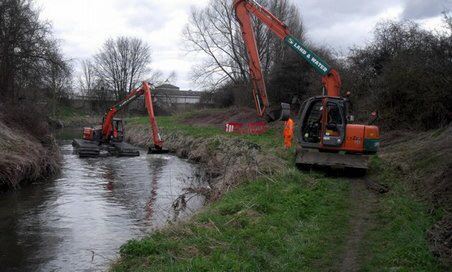
Dredging rivers risks increasing flood risk downstream and does huge damage to fish habitat and wildlife
There’s a golden rule of government that says never try and formulate a change in public policy purely as a response to a crisis. Resist the mob, ignore the media froth and give the ‘something must be done brigade’ the respect that their ideas deserve, which is not always a lot. Good policy doesn’t always make for good headlines but policy based on evidence is likely to deliver and endure a darn sight longer than knee jerk reactions and short term concessions to the loudest voices.
Then..
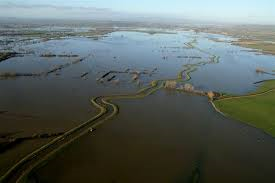
Somerset Levels after the records rains of the 2013/14 winter
In 2014, when the farmers on the Somerset Levels, whose upstream neighbours poor agricultural practices had increased the flood risk, demanded a return to wholesale dredging our Prime Minister and his ministers were only too keen to ignore the evidence of their experts and roll over. Treasury rules were ripped up, evidential studies on the impacts of dredging were ignored and subsequently removed from government websites, and, inevitably, cheques were written on behalf of the taxpayer. All for a flood that affected a tiny fraction of the properties that were inundated this time or, indeed, in the floods of 2007.
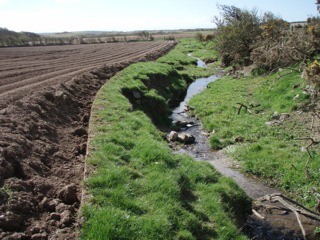
Poor agricultural practices have been responsible increasing run off and causing flash flooding.
In an artificial landscape like the Levels, much of which is below sea level, some dredging and pumping is inevitably necessary to allow the waters to drain in a seaward direction. But this is hardly a template for the wholesale changes that many were seeking to impose across the rest of the country where our rivers and flood plains are still functioning as dynamic systems in their own right.
There was a time in the 1960s and 70s when the old river and drainage boards treated rivers as little more than channels to convey water to the sea as quickly as possible. Functional flood meadows were drained for either agriculture or house building, bends were straightened and channels deepened. It was a discredited policy that was rightly curbed. The environmental damage was appalling, habitat for fish and wildlife disappeared and catchments that once functioned as nature intended with water flowing into the surrounding land and taking its time to re enter the channels changed into Jekyll and Hyde beasts. Either lifeless ditches or foaming torrents rushing flash floods downstream to threaten homes and communities at the bottom of the valleys.
Back in 2014 the Angling Trust joined water engineers and wildlife groups to express grave concern about any proposed increases wholesale dredging because the evidence from the Environment Agency shows that in many cases it simply increases the speed and volume of water heading into main rivers which will then flood more towns and cities. What has happened recently in Yorkshire is sadly a case in point. We produced a report entitled ‘Floods and Dredging – A Reality Check’ which I presented as evidence to the Select Committee inquiry into the 2014 floods. It’s probably fair to say that our interventions helped prevent what was agreed for the Somerset Levels from becoming the norm. http://www.ciwem.org/media/1035043/floods_and_dredging_-_a_reality_check.pdf
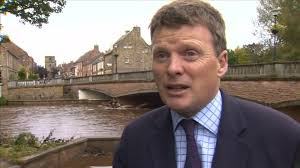
Former Environment Minister Richard Benyon has spoken out strongly against a return to the wholesale dredging of rivers
There were a few politicians who were prepared to stand up and be counted including my former parliamentary neighbour and erstwhile Environment Minister Richard Benyon who challenged his own government to heed the evidence which showed that in many cases dredging rivers was either futile, as they simply readjusted their profiles, or at worse downright dangerousness. Benyon wrote a hard hitting piece taking his own ministers to task and warning of the dangers of listening to ‘armchair hydrologists’ rather than the advice of their own Environment Agency.
You can read it here:
And Now..
So what about this time around, have lessons been learnt and is the dredging mob still in full cry?
It’s a mixed picture but it’s not without hope. The mood music at the recent parliamentary debate into the governments response to the floods had changed with MP after MP from both sides of the Commons citing the importance of upland catchment management. It was pleasing to hear them extensively quoting the widely acclaimed Prof. Dieter Helm from Oxford University whose report ‘Flood Defence: Time for a Radical Rethink’ makes the powerful case for holistic catchment management including incentivising farmers to store flood water rather than moving it on as quickly as possible.
See here: http://www.dieterhelm.co.uk/node/1414
Of course, there are those who still don’t get it, or if they do are more interested in pandering to the demands of agri businesses rather than helping flood victims or protecting the environment. Sadly, they tend to be found sat around the Cabinet table pretending to be Secretaries of State at DEFRA – the department that Monbiot has renamed as ‘Doing Everything Farmers Representatives Ask’!
As we have seen the current incumbent Elizabeth Truss has just announced her intention to deregulate dredging on smaller watercourses to protect ‘a million acres of farmland’ whilst her predecessor Owen Paterson has claimed that by increasing dredging in the Somerset Levels he personally saved them from flooding this winter.
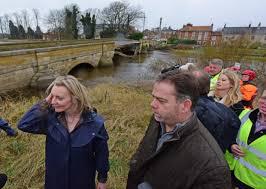
The current Environment Secretary Liz Truss needs to explain to flood victims why she favours protecting farmland over homes or at least admit that she has not yet grasped the laws of gravity.
Well Truss will have some hard questions to answer when communities downstream from her deregulated zones next flood so I guess it won’t be long before her idiotic words and irresponsible shift in policy comes back to haunt her. Paterson, on the other hand, has thankfully been removed from office and a quick look at this December’s rainfall figures, compared to the long term average, for the South West (61%) and North West (191%) shows the nonsense of his claims and why is he was ill suited to ever hold this post.
Climate Change means more floods and more droughts and on this crowded island of ours we will only deliver the resilience necessary to combat these challenges by recognising that the laws of nature are a lot more powerful than the laws of man and that we need, where possible, to work with them.










